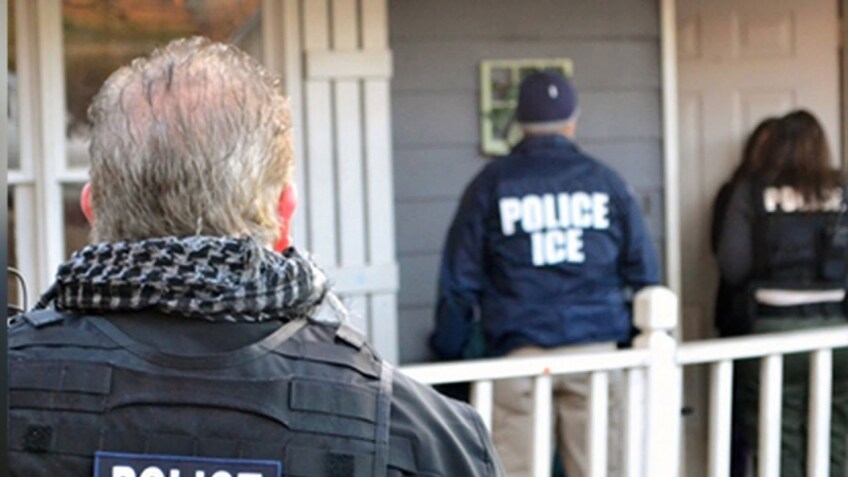Inland Congressmen Divided on Bills Targeting Undocumented Immigrants

Riverside County congressional representatives joined nearly all their colleagues in voting along party lines Thursday on bills approved by the U.S. House of Representatives seeking to stiffen penalties for previously deported immigrants living in the country illegally who commit crimes and to suspend federal grants to jurisdictions with "sanctuary" policies.
"I strongly believe that we must restore the rule of law and take responsible steps to protect Americans," Rep. Ken Calvert, R-Corona, said after H.R. 3003 was approved by a vote of 228-195 and H.R. 3004 was approved 257-167.
"Fixing our broken immigration system is complicated, but we should all support deporting illegal immigrants who have committed violent crimes. Unlike the actions being taken by Democrats in Sacramento, Republicans in Washington are passing bills that give our law enforcement community additional tools and put the well-being of legal residents first and foremost," he said.
Calvert and Rep. Duncan Hunter, R-Temecula, joined 223 fellow Republicans and three Democrats in voting for H.R. 3003, the "No Sanctuary for Criminals Act," and 231 Republicans and 24 Democrats in approving H.R. 3004, "Kate's Law."
Reps. Raul Ruiz, D-Coachella, and Mark Takano, D-Riverside, joined 186 Democrats and seven Republicans in voting against H.R. 3003 and 164 Democrats and 1 Republican in voting against H.R. 3004.
Ruiz said he liked the provision in H.R. 3004 that called for "tough penalties" against "undocumented violent criminals," but he couldn't support the bill as a whole because "it goes too far, imposing harsh penalties ... on those who commit misdemeanors like shoplifting."
"This cruel provision will needlessly tear families apart and cost taxpayers billions," Ruiz said.
On H.R. 3003, Ruiz opined that it "does nothing to protect Americans from crime."
"This bill will discourage people from cooperating with the police, or reduce resources for law enforcement," he said. "Either outcome will make our neighborhoods less safe."
The bills were introduced by Rep. Bob Goodlatte, R-Virginia, and have been embraced by the White House. Calvert was the lone Californian among the 17 co-sponsors of H.R. 3004, all Republicans.
Both bills are now bound for the Senate.
H.R. 3003 reinforces Immigration and Customs Enforcement's detainer authority, establishing statutory probable cause standards that explicitly justify holding an illegal immigrant offender for federal agents.
The bill would also authorize federal agencies to withhold grants from states or localities that attempt to frustrate federal immigration enforcement by enacting sanctuary policies that permit -- or promote -- local law enforcement's release of immigrant offenders facing deportation, or otherwise attempt to shield them from ICE and the U.S. Border Patrol.
Goodlatte referred to the deaths of 21-year-old Sarah Root of Omaha, Nebraska, and 21-year-old Grant Ronnebeck of Mesa, Arizona, in framing his argument in favor of H.R. 3003.
Root was allegedly killed by a Honduran national, Edwin Mejia, who slammed into her vehicle while driving under the influence. He's still at large.
Ronnebeck was allegedly gunned down by a convicted felon from Mexico, Apolinar Altamirano, during a convenience store robbery. Altamirano was facing deportation proceedings at the time.
H.R. 3004 establishes sentence enhancements, adding up to 25 years onto an immigrant offender's sentence if he or she committed crimes after returning to the United States following an earlier deportation.
Goodlatte pointed to the slaying of 32-year-old Kate Steinle on a San Francisco pier in 2015 as one of the motivations for "Kate's Law."
The woman was allegedly randomly shot by a convicted felon, Juan Francisco Lopez-Sanchez, who had been deported on five previous occasions. He reportedly told authorities that he had intentionally settled in San Francisco because it was a "sanctuary city."
According to Goodlatte, another five-time deportee to Mexico, Nicodemo Coria-Gonzales, committed nearly a dozen sexual assaults in Texas, including one involving a 68-year-old woman.





